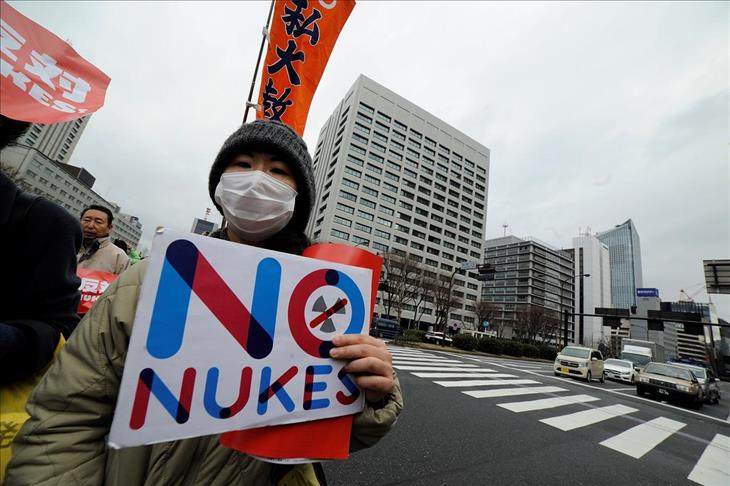Japanese anti-nuclear protesters take battle to courts
In wake of Fukushima, anti nuclear groups fission for legal victories to stop utilities returning on line.

By Todd Crowell
TOKYO
Public opinion polls have consistently shown that the Japanese oppose restarting the country's now idled nuclear power plants, but anti-nuclear groups have never been able to translate this voice into an effective opposition.
While the government of pro-nuclear Prime Minister Shinzo Abe was returned to power with a massive majority in the late 2014 general election, candidates who oppose nuclear power in their prefectures have mostly lost in local elections.
So anti-nuclear groups have turned to the courts – so far with more success.
It has been more than a year since any of Japan’s 43 operable nuclear power plants have been on line. For many the enforced outage has extended for three to four years since the nuclear disaster at the Fukushima Daiichi plant in March 2011.
In the wake of the disaster, parliament created the independent Nuclear Regulation Authority (NRA), which developed new safety guidelines learned from the disaster - safety measures that have been called the strictest in the world.
Any utility wishing to restart its reactors must petition the NRA to determine if their safety measures conform to the new guidelines. Since the window for applications opened in July, 2013, more than a dozen such petitions have been received.
The procedure at first seemed straight forward. The NRA would confirm the safety of the plant and it would go back into operation - provided it got local permission. It was thought that by this time of year there would have been as many as half a dozen reactors back in operation.
But that procedure is taking much longer than anyone expected.
The NRA has given its preliminary approval to two utilities. The first to the Kyushu Electric Power Co for its Sendai plant in Kagoshima prefecture near the southwestern tip of Japan.
That was in July 2014. It now expects to re-start one reactor by August, 13 months after the approval.
But as far as nuclear power opponents are concerned, the NRA sign-off is not necessarily the last word on safety.
A district court injunction this month was aimed at two reactors at Takahama, which was the second plant to get the NRA go-ahead.
Opponents had petitioned the court in Fukui prefecture, where Takahama is located, saying it would not withstand a strong earthquake.
The plant owner, the Kansai Electric Power Co., which has historically been the biggest user of nuclear power in Japan, indicated that it plans to pursue all of the preliminary steps, including gaining local approval from the host community and prefectural governor while it appeals the court’s decision.
But it is not known whether it can get the injunction lifted - assuming it can - by November, which was the month when it had wanted to go back online. By some accounts the appeal process, assuming it goes all the way to the Supreme Court, could take more than a year.
Kansai power company has called the injunction “regrettable and utterly unacceptable.”
The national government, which favors restarting plants that are certified as safe, also complained about the injunction.
“The reactors have been judged by experts to meet new standards of safety that are some of the world’s strictest," said chief cabinet secretary Yoshihiko Suga.
Back in July, one could almost hear the palpable sense of relief across the nuclear industry in Japan when the Kagoshima court rejected the injunction, meaning that the Fukui court’s decision in Takahama and earlier for Ohi 3-4 may be eccentric and not representative of future court rulings.
But the Tokyo-based Liaison Group of Lawyers to Stop Nuclear Power - now said to number about 300 members - is planning to sue every utility in Japan that attempts to return its plants to capacity.
But for lawyers such as Hiroyuki Kawai hope is at hand
“We've succeeded in obtaining the strongest weapon for preventing the restart of nuclear power plants,” he said earlier this month – the courts.
Anadolu Agency website contains only a portion of the news stories offered to subscribers in the AA News Broadcasting System (HAS), and in summarized form. Please contact us for subscription options.

